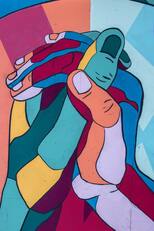 by Ariana Tucker Go onto any major book-selling website and you’ll probably find a section dedicated to Black authors in the list of genres and subcategories. Amazon calls theirs “Amplify Black Voices” and lists it among other popular keywords like “Award Winners” and “Celebrity Picks.” Barnes and Noble calls theirs “Black Voices” and lists it among other browsing options such as “Large Print Books” and “Trend Shop.” Click on either link and you’ll see popular books written by Black authors, most of which are the same books we’ve been talking about for the last five years. Barnes and Noble is the worst offender of this. On their featured page of “Fiction: Black Voices,” only four were published between 2020 and 2021 (Colson Whitehead’s Harlem Shuffle is their featured book from 2021). The rest are classics by Nella Larsen, Zora Neale Hurston, and Ralph Ellison and books by authors like Chimamanda Ngozi Adichie and Sister Souljah, which were published in the 2000s and 2010s. Amazon at least offers a more up-to-date list of recently released books by month and recommendations from editors and Black icons like Billy Porter and Rick Ross. You can find almost any genre and any subject here, the only difference is that the authors are all BIPOC.  This classification seemed to become increasingly more visible following the murder of George Floyd. With the resurgence of the Black Lives Matter movement, big companies felt the pressure to “amplify” and acknowledge BIPOC writers outside of their usual February feature. Seeing this made me start to wonder if these companies were doing more harm than good. After all, there’s no section for white writers, and we only recently started seeing features for APPI and Latinx writers (although both are not considered “popular” by Amazon’s and Barnes and Noble’s standards). It seems to send an unintended message: that white writers still have a sort of ownership over the literary market; that Black writers are only amplified when others aren’t there to silence them. As a Black woman, I have a problem with this sort of marketing. While attempting to demarginalize underrepresented voices, they’ve only moved us from one margin to another. These companies push “Black literature” as a separate genre where the color of the author’s skin and character’s skin are the only selling points. The end product isn’t representation, but a sort of segregation in which BIPOC writers are only acknowledged when they stand alone. Don’t get me wrong, I’m all for diversity. I’m an advocate for the importance of absolute inclusion. The National Education Association believes that good literature acts as a window and a mirror— a way for readers to see others and themselves in the text that they’re reading. Both are equally vital as a way to teach the all-important skill of empathy. The earlier people learn to be empathetic, the earlier we can combat the subtle biases that continue to breed racism. Outside of an educational setting, that representation is still important. A 2006 study by novelist and psychology professor, Keith Oatley found that people who read more fiction scored higher on empathy tests. The more diverse our books become, the wider our empathy expands. However, while representation allows for some diversity, it’s also the bare minimum we can do to eliminate color lines. In fact, representation relies on those lines remaining in place. I certainly see why there may have been a time where such a classification as “Black Voices” was needed just for the sake of visibility, but shouldn’t we be past this by now? Past the point where we rely on exclusivity to create the illusion of inclusivity.? Just “amplifying” Black voices allows us to ignore the underrunning problems of representation in publishing. A 2019 study completed by Lee & Low Books showed that seventy-six percent of people working in publishing were white. Black people only made up a dismal five percent of their pool of over 7,000 responses. This is compared to their 2015 study which found that seventy-nine percent of publishing staff were white. So, in four years, we haven’t really seen much of a shift in dynamic. And maybe this lack of diversity in publishing staff has a lot to do with the kinds of things that get published. Black writers are faced with just as many constraints as before, but now they’re even subtler. We’re faced with publishers that claim they want to better represent and diversify the books they produce, but they seem to be more interested in books about racial injustice than books where the fact that the main character is Black isn’t a focal point. It seems to be the one thing that the press always wants to focus on whenever speaking to Black authors--questions Toni Morrison had to answer her entire career—but publishers only see the success. When they get to be part of the outpouring of racial justice charged novels, they get to pat themselves on the backs while continuing to exclude Black voices from spaces where they get to just be.  Blackness shouldn’t be a selling point or a marketing strategy. It shouldn’t be the product we’re pushing. It’s damaging to see Blackness sold on shelves. It sends an unintentional message that we’re only wanted and desired in certain ways and for certain uses but excluded in others. During the 2020 quarantine period, Blackness became a trend and a buzzword. Books written by Black people became specimens to be examined and displayed instead of art to be felt and experienced. What happens when the trend dies off and the only places we exist is in the margins once again? Of course, there are Black writers and entertainers who don’t see the damage I see. They use their platforms to amplify their fellow Black and, more broadly, BIPOC writers. And maybe it’s good on some levels. Maybe it’s good that future Black writers will get to see people like them published in a world where we still seem to favor whiteness as the default. Maybe it’s good for Black creators to celebrate other Black creators. At least in this sense, we have some control over how we’re being represented. But let’s push further than representation. Let’s aim for inclusivity in publishing where representation is an afterthought. Because we won’t be reading Black Literature, just literature.
0 Comments
Leave a Reply. |
Archives
July 2024
Categories
All
|
|
Glassworks is a publication of Rowan University's Master of Arts in Writing 260 Victoria Street • Glassboro, New Jersey 08028 [email protected] |
All Content on this Site (c) 2024 Glassworks
|

 RSS Feed
RSS Feed
